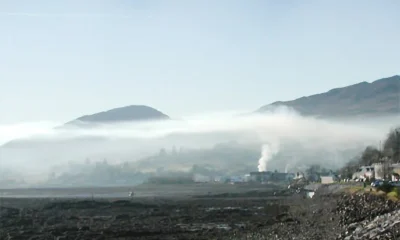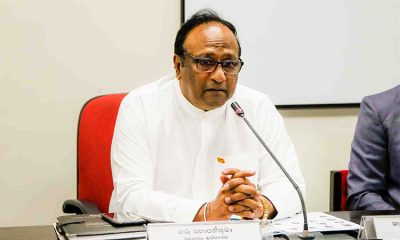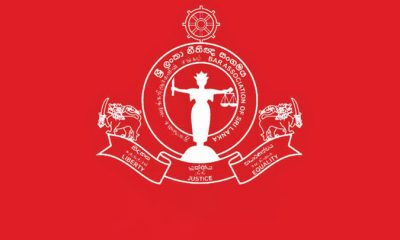News
Weerasekera rejects BASL allegation that his speech in Parliament was ‘brazen attack on judiciary’

SLPP MP and retired Rear Admiral and Sarath Weerasekera, replying to a Bar Association of Sri Lanka (BASL) statement published in The Island on 12 July, yesterday rejected the allegation that his speech in Parliament on 07 July was a brazen attack on the judiciary.
Weerasekera’s response: “I think your press release was to show your solidarity with the lawyers in Mulativu without probing the relevant incident at Kurundi Buddhist Temple Complex.
“Every citizen in the country is fully aware that the judiciary should be allowed to operate independently, free of external pressures, etc., which the Bar Association doesn’t have to emphasise.
“I would like to remind the BA that once the TNA legislator M.A. Sumanthiran, in parliament, accused the Supreme Court of swinging like a pendulum. During the debate on 22 A, he said if the Supreme Court can’t read and understand their own determination ask them “to go home”! Why didn’t BA issue a statement condemning that? Was it not a brazen attack on the judiciary? Is the BA afraid of Sumanthiran?
“I would like to remind the Bar Association of the report submitted by the special rapporteur Monica Pinto on “Sri Lankan judiciary” to the UNHRC. A few of the allegations she has leveled against our judiciary were as under.
“a. Judges are reportedly often offered government or other political offices after retirement. This practice raises concern regarding possible conflict of interest and casts doubts on the independence and impartiality of the judges who may be hoping to obtain such positions.
“b. Overall judicial independence seems to have been gradually eroded over the years.
“c. Bar Association during certain periods strongly divided along political lines. The politicisation of the association is a source of great concern.
“d. Judges frequently push defendants to plead guilty. When defendants plead guilty judges can expedite their cases and improve their statistics.
“e. In general the Admin of justice should be more transparent, decentralised and democratic.
“We haven’t seen the BASL, which is supposed to safeguard the independence and dignity of our judiciary making any statement Against such a derogatory report.
“However I must mention that I volunteered and attended the UNHRC session on 18 June 2017 and declared that Monica’ s report was a derogatory of our judiciary with a proud history of 200 hundred years.
“Also, I asked her how she had come to the conclusion that the Sri Lankan judges were incompetent, incapable, poorly selected, corrupt, cowardly and partial within just eight days of her visit to the country.
“I said it was a preconceived and predetermined observation of Pinto and invited all to look at the achievements of the judges who worked in foreign countries.
“This was how I safeguarded the dignity of our judiciary at international level when the BASL was keeping quiet.
“I, as a parliamentarian, am fully aware how to conduct myself in parliament. I request the BASL to visit the North and observe how the Buddhist ruins are being plundered and destroyed by ruffians and how the Chaithyas are raised to the ground.
“The archaeological officers are threatened with death and cases filed with the help of Mulativu lawyers to delay renovations and then destroy what has been already done.
“We all respect our judiciary. But the lawyers also have a moral obligation to think twice before appearing for goons who destroy our heritage.”
News
Prime Minister inaugurates the 2025 Buddha Rashmi Vesak Zone

The 2025 Buddha Rashmi Vesak Zone, jointly organized by the Hunupitiya Gangaramaya Temple, the Presidential Secretariat, and the Prime Minister’s Office, was ceremonially inaugurated on May 12 by Prime Minister Dr. Harini Amarasuriya.
During the opening ceremony, the Prime Minister shared the following thoughts:
“The Buddha Rashmi Vesak Festival, held with the collective effort of all communities residing in the city of Colombo, is truly special. The religious harmony that exists within Colombo plays a significant role in making this event successful. Thanks to this harmony, we witness a large number of Dansals and Vesak festivities. These Dansals are organized through the collective efforts of people across the city, who contribute both financially and physically to make them possible.
The efforts made by the Chief Incumbent of the Gangaramaya Temple, Venerable Kirinde Assaji Thero, to nurture Sri Lankan Buddhist enlightenment, Buddhist culture, and national identity not only among local Buddhists community but also to foreign Buddhists community and international visitors, must be sincerely appreciated.
At this moment, I also remember with deep sorrow those who lost their lives in yesterday’s tragic bus accident in the Kotmale area, and I extend heartfelt sympathies to their families. I also wish a speedy recovery to those who were injured.”
The event was attended by Minister of Buddha Sasana, Religious and Cultural Affairs, Hiniduma Sunil Senevi, High Commissioner of India, His Excellency Santosh Jha and other High Commissioners and Ambassadors including Secretary to the Prime Minister, Mr. Pradeep Saputhanthri and a distinguished gathering of guests.
(Prime Minister’s Media Division)
News
Expert: Mismanagement of CEB hydro resources increases costly oil-powered electricity generation

The Ceylon Electricity Board (CEB) is in one of the strongest hydro storage positions in recent memory, but it has mismanaged key hydropower complexes, causing an increase in oil-powered electricity generation and and costs.
Energy expert Dr. Vidura Ralapanawe has raised serious concerns over CEB’s operational decisions, particularly the skewed use of the Mahaweli and Laxapana hydropower complexes. “By mid-May, the system had ample storage — about 60% overall — which is actually a very good position to be in just before the South-West monsoon rains,” he said. “But within that headline figure is a huge imbalance. Mahaweli reservoirs are near 75%, while Laxapana is languishing at 30%.”
This lopsided storage has already caused direct operational problems. The Canyon power station, which is fed by the Maussakele Reservoir in the Laxapana complex, has been forced to reduce its output. The 60MW plant is now operating at just 40MW due to limited water availability. Downstream, the 100MW New Laxapana station is similarly constrained.
The Laxapana complex is not just another hydropower asset — it plays a vital role in Colombo’s drinking water supply. It is required to run continuously to maintain flows for water treatment plants. “That means the CEB must generate from Laxapana 24/7, no matter what,” Ralapanawe said. “So how did they allow it to reach such a critically low level, especially when Mahaweli reservoirs are full?”
Ralpanawe said: “Instead of making adjustments to maintain operational flexibility, the CEB appears to have run the Laxapana complex harder than necessary in previous months while underutilising Mahaweli, where Victoria and Randenigala are sitting comfortably. The consequence? More reliance on oil-based thermal generation, even as the country’s dams remain well-stocked.”
“This is not just a technical problem — it’s an economic one,” he stressed. “Oil is expensive. When you underutilise hydropower in a year like this, you’re actively choosing to drive up the cost of generation.”
The apparent lack of coordination between the Mahaweli and Laxapana systems is especially baffling given the CEB’s long-standing familiarity with both. “The CEB has operated these systems for over 40 years. They know the inflows, the rainfall patterns, the seasonal irrigation releases — none of this is new,” Ralapanawe said.
Moreover, the growing integration of AI and data-driven forecasting tools in the global energy sector makes such mismanagement increasingly indefensible. “If, in the age of AI, we’re still hearing that ‘it’s too complex’ to manage these reservoirs in tandem, then something is seriously wrong,” he added.
Dr. Ralapanawe urges the CEB to provide an explanation: “Why was Mahaweli underdispatched when it was full? Why was Laxapana overused to the point that we now can’t get full capacity from critical plants like Canyon and New Laxapana? What is the economic impact of burning more oil than necessary?”
The missteps are already costing the public. Higher generation costs will ultimately be passed on to consumers in the form of increased tariffs, a burden made heavier in an already strained economy,” says Dr. Ralapanawe.
Ironically, 2025 was shaping up to be a strong hydro year, offering a rare opportunity for cost savings and reduced fossil fuel use. Instead, mismanagement has left key reservoirs unbalanced and locked the system into a more expensive operating mode — one that benefits oil suppliers but punishes the average household and industry.
Dr. Ralapanawe’s message is blunt: “This is not just about water and electricity. This is about public accountability and economic responsibility. If the CEB cannot manage two hydro systems properly with decades of data at its fingertips, then it must rethink its leadership and planning structures — or risk repeating the same costly mistakes year after year.”
Our efforts to contact CEB officials for comment were in vain.
By Ifham Nizam
News
Million Lankan women workers will lose their jobs if Trump’s 44 % tariff goes into effect

As many as a million Lankan women workers in key export sectors will lose their jobs and income if the 44 percent tariffs imposed by US President Donald Trump come into force at the end of the 90-day pause, Asia News has reported.
Sri Lanka’s main export industries, such as apparel, tea, gems, rubber and cinnamon, that employ mostly women, will be the most affected by the new tariffs since the US market is one of their most lucrative.
Apparel workers reproach the government for its “lethargic attitude” and failure to consider the concerns of workers and unions, not least because their representatives were not asked to participate in the discussions on tariffs.
The apparel industry accounts for about 40 percent of the country’s total exports, and is crucial for its economy. It also employs mainly women from low-income backgrounds in rural areas, for whom these jobs represent a crucial pathway out of poverty.
Since most apparel workers are also breadwinners, their wages help extended family networks in economically disadvantaged regions.
“The Women’s Centre collaborated with 25 other women’s organisations to carry out our campaign against the US tariffs hindering women workers,” said its Executive Director, Padmini Weerasuriya.
If the tariffs go into effect, “Their take-home pay will decrease significantly,” she added. “As orders dip and approximately six million dependents will also be severely impacted.”
“These women need job security as factories are already discussing about possible layoffs of workers, since demand is likely to drop.”
Compared to India and Bangladesh, she warns, Sri Lankan women face greater competition since “the tariffs imposed on Sri Lanka are higher”. That is why several manufacturers are already moving their operations to Vietnam, Bangladesh and Africa.
If plants shut down, more than 350,000 women working will be impacted. AsiaNews met three of them, 33-year-old Subadra Aponsu, 31-year-old Hemamamli Akaravita and 30-year-old Sandamini Tissera who spoke about their difficulties.
“We are the breadwinners of our families as our parents are elderly and sick. Our siblings are married and they are unable to provide for our parents. During the past several years, we have been working hard and providing for our families. If we lose our jobs, we have no option but to mortgage our homes,” they explained.
“During the economic crisis, we had to sell our paddy fields. Currently, our employers are planning to leave the country. We may lose our jobs shortly. We are unable to find employment elsewhere as almost every apparel manufacturer is planning to sell their business. In our boarding house, several women have already lost their jobs.”
According to economic analysts Sampath Amarasinghe and Niroshini Caldera, “due to the new tariffs, there will be a significant decline in export volumes with a severe erosion of Sri Lankan goods’ competitiveness in US markets.” All this, they warn, could result in “many Sri Lankan products ending up out of reach for US consumers and businesses.”
The greatest risk concerns “price- and cost-sensitive categories like garments, where profit margins are already low and competition from other countries is intense.”
The new tariff will see exports to the United States drop by 20 percent, with an annual loss of about US$ 300 million in foreign currency earnings.
As Sri Lanka’s total exports of goods in 2024 reached US$ 13 billion, the experts conclude, this represents “a major blow to the country’s balance of trade” and “economic growth prospects”.
Meanwhile, several women’s groups started a petition last week in the Katunayake Free Trade Zone (the first and largest of the country’s eight FTZs). – (AsiaNews)
-

 Features3 days ago
Features3 days agoSAITM Graduates Overcome Adversity, Excel Despite Challenges
-

 Latest News7 days ago
Latest News7 days agoNPP win Maharagama Urban Council
-

 Business6 days ago
Business6 days agoJohn Keells Properties and MullenLowe unveil “Minutes Away”
-

 Sports3 days ago
Sports3 days agoASBC Asian U22 and Youth Boxing Championships from Monday
-

 News3 days ago
News3 days agoDestined to be pope:Brother says Leo XIV always wanted to be a priest
-

 Foreign News4 days ago
Foreign News4 days agoMexico sues Google over ‘Gulf of America’ name change
-

 Opinion6 days ago
Opinion6 days agoRatmalana: An international airport without modern navigational and landing aids
-

 Opinion3 days ago
Opinion3 days agoDrs. Navaratnam’s consultation fee three rupees NOT Rs. 300






















